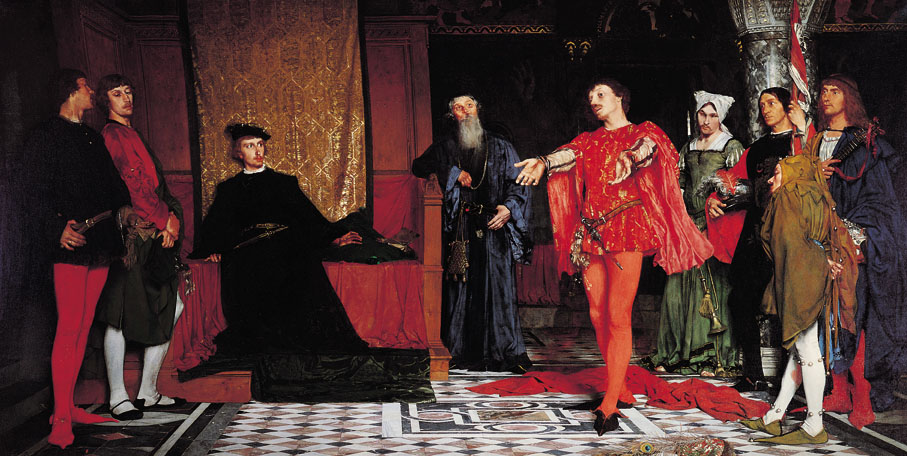All the world’s a stage,
And all the men and women merely players.
They have their exits and entrances,
And one man in his time plays many parts.
-Shakespeare, As You Like It
Do we ever experience the world as a stage upon which characters come and go, plots thicken and unfold, and a faux dialogue is exchanged? Have you ever felt that you were watching your life as if it were a television show, looking in from the outside instead of living it from the inside? Perhaps at times we feel that we are living life on autopilot-that we fulfill our duties out of routine, but we aren’t truly living, truly enacting our choices, decisions, and actions.
It may seem that we are putting on an act, the likes of which could have come straight out of one of Shakespeare’s plays. We put on a mask, speak our lines, and receive a standing ovation. Yet we know that it is not real. After the show, we are unmasked and the illusion fades. We know that few have seen our true face, our true self. In the case of an actor, no one demands that he become the character he plays. No one expects that he and his character are the same. But it is a different story when it comes to life and love.
What does authentic love look like? Existentialists place a great deal of importance in personal authenticity: living from one’s true self, enacting one’s choices and actions on the basis of one’s personal desire. This requires shedding the mask. Being authentic demands living out who you truly are. It requires a presence of self in one’s actions. Yes, it even entails a certain vulnerability and transparency in acting. For instance, the authentic literary critic is the one who speaks his mind and isn’t afraid to say what he really feels about a work. To a certain degree, this critic has allowed himself to become transparent to the gaze of others. He is expressing his true opinions on the book in question. He is acting from his true self.
Personal authenticity, being at one with oneself, affects much more than the way we approach our job. It impacts how we view ourselves, how we approach life in general, and the way we relate with family and friends. Being authentic with someone calls for a truthfulness with them. You speak and act in accordance with your real feelings and convictions. Yet how can we have this kind of vulnerability without love? Unless we are loved and love in return? How can we be ourselves, how can we be real with our family and friends unless we know that they love us?
We can only step into our true identity, we only fully realize who we are, under the gaze of love. The one who loves us looks into our heart and sees our potential for true greatness. Love says to the beloved: become who you are, become who you are meant to be. It is only when I am loved that I am open to becoming personally authentic. But then again, our personal identity, who we are, depends on how we love others. We only become who we are meant to be through loving to the full. Thus our personal identity is unavoidably and inextricably bound to the love we receive and give.
Real love demands that we be personally authentic. It demands that we be honest with ourselves and with others. It calls for a deep trust between lover and beloved that can only be founded on the truth. Moreover, the word of love can only be spoken with the whole person. One must fully possess oneself, one’s “I”, in speaking those words which every beloved longs to hear: “I love you.” For it is only when we possess ourselves that we are able to give ourselves away. Yet we come upon the seeming contradiction that it is only when we are loved that we can truly possess ourselves. And still further, it is only when we love others that we come into our true identity.
 It seems that love is a gift both received and actively given. In order to love ourselves and to know our own dignity and worth, we must be loved by others. This is a gift that we cannot give to ourselves in isolation. Yet at times we must take a courageous step forward in order to initiate love. In this active striving to give ourselves, we may discover a great love hiding within, awaiting our decision to enact it.
It seems that love is a gift both received and actively given. In order to love ourselves and to know our own dignity and worth, we must be loved by others. This is a gift that we cannot give to ourselves in isolation. Yet at times we must take a courageous step forward in order to initiate love. In this active striving to give ourselves, we may discover a great love hiding within, awaiting our decision to enact it.
Let us always endeavor to cultivate authentic love in our lives. For the sake of the audience, the Shakespearean actor mounts the stage to speak with vigor and grace. Perhaps likewise we ought to mount the stage of life, to love with such gallantry and beauty as to rival the words of Shakespeare. Yes, perhaps it is our task to put our whole hearts into the poetry of love. Then, after all, we might find that the part we are playing, the part in which we speak most eloquently, is our own.
---------
Image 1: Actors before Hamlet, Wladyslaw Czachorski (1850-1911). 1872-1875. National Museum in Warsaw. (source)
Image 2: Globe Theatre in London. Photo by Tohma. 18 August 2007. (source)



0 comments
Note: Only a member of this blog may post a comment.